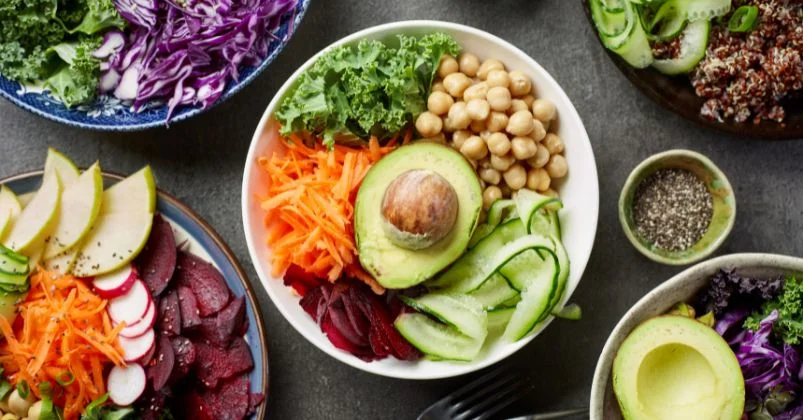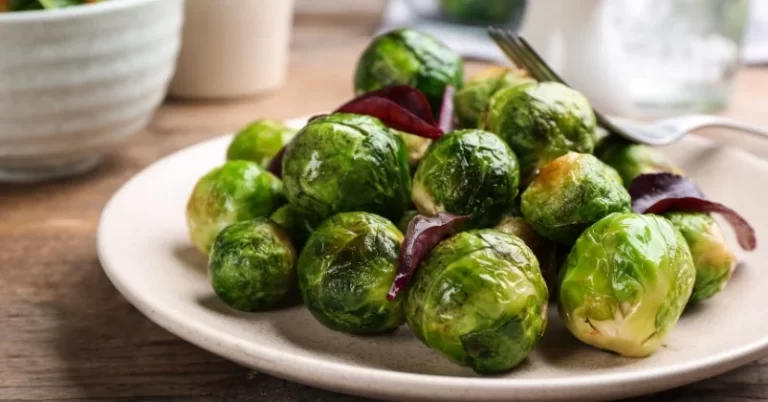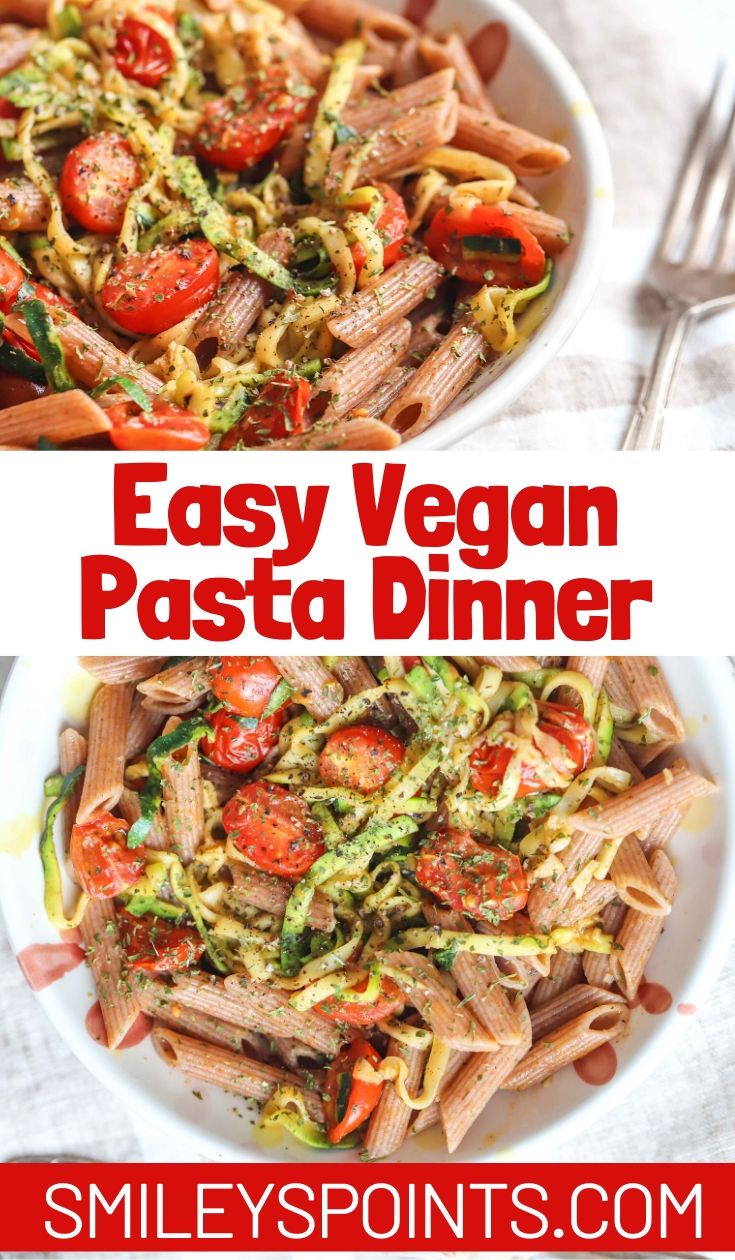Want Your Plate Green? Try Vegan Diet For Weight Loss
In addition to being a product of one's cultural and social heritage, becoming a vegetarian is currently a very popular mass movement. It's a movement that's gotten stronger.
A carefully thought-out vegetarian diet is perfectly balanced. All meat and its byproducts are prohibited under this dietary regimen. In some societies, being a vegetarian may entail eating eggs.
A vegetarian diet must include fresh fruits, vegetables, grains, legumes, nuts, and seeds. You may maintain your ideal weight and keep active by eating a well-balanced vegetarian diet. It can meet all of your nutritional needs.
In this article, we will look into vegan diet for weight loss, how ideal is vegan diet is, and about sample vegan meal plans.
Is Vegan Diet A Good Choice For Weight Loss?
Going vegan can be a healthy approach to weight loss, but it's important to make sure that the diet is balanced and provides all necessary nutrients. It may seem unhealthy to eliminate some of the major food groups from your diet. And it might be if you don't carefully monitor your nutrition.
For instance, some people may be concerned about receiving enough protein or other necessary nutrients, such as vitamin B-12. Only animal products have this vitamin naturally, so if you don't get enough, it could make you anemic. To prevent deficiencies, vegans must include vitamins, cereals fortified with vitamins, and fortified soy products in their diet.
Furthermore, some people could struggle after being vegan with yo-yo dieting. Why does this matter? It occurs when you go through cycles of losing weight and then gaining all or more of it, perhaps after finding it difficult to keep to a vegan diet. A higher incidence of type 2 diabetes and heart disease are two severe health effects of this style of dieting.
Despite these and other potential drawbacks, it is still possible to consume a vegan diet healthily and shed some pounds. As with any diet, the secret is to prioritize nutrient-dense foods over foods high in empty calories. These would be items like:
- Fresh fruits and veggies for vegans
- Nuts and seeds
- Beans and legumes
- Greens
- Root vegetables
- Whole grains
Limit or stay away from manufactured vegan food that has these additional ingredients:
- Salt
- Carbohydrates
- Sugars
- Fats
- Food additives
Is Vegan Diet Right For Everyone?
Generally, everyone cannot adopt or follow the vegan diet. Fruits, vegetables, soy, legumes, nuts, nut butter, dairy substitutes made from plants, sprouted or fermented plant foods, and whole grains are all part of vegan diet pattern. Vegan diets exclude animal products such as dairy, meat, poultry, eggs, and shellfish.
Additionally, they are free of animal byproducts like honey (produced by bees) and less well-known animal-based ingredients like whey, casein, lactose, egg white albumen, gelatin, carmine, shellac, vitamin D3 derived from animals, and omega-3 fatty acids derived from fish.
When selecting a diet, it's critical to take into account a person's specific nutritional requirements, including lifestyle, medical problems, and personal preferences. Individual dietary requirements differ, and some people may need elements like vitamin B12, omega-3 fatty acids, and iron that are challenging to get from a plant-only diet.
On a vegan diet, some people might thrive while others might not obtain enough of some nutrients. To ascertain whether a particular person would benefit from a vegan diet, it is advised to speak with a healthcare professional or a registered dietician.
Who Should Not Go For Vegan Diet?
Vegetarianism has many positive health consequences, including a lower risk of diabetes, weight loss, and protection against cardiovascular disease and stroke. Not everyone who consumes vegetarian food, though, is healthy.
Before adopting a vegan diet, anyone with certain medical issues like anemia, malnutrition, pregnancy, or certain vitamin/mineral deficits should speak with a doctor. Additionally, people who are particularly active or have higher nutrient needs, such as athletes or developing children, may not be able to follow a vegan diet.
How To Use Vegan Diet For Weight Loss Safely?
Here is some advice for safely losing weight while following a vegan diet:
- Emphasize entire, nutrient-rich foods: Vegetables, legumes, whole grains, nuts, and seeds should all be consumed in moderation.
- Make a meal plan: Make sure you are consuming adequate amounts of fiber, healthy fats, and protein.
- Be aware of portion sizes: Even eating wholesome foods in excess can result in weight gain.
- Limit processed foods and added sugars: These might contain few nutrients and lots of calories.
- Hydration: Remain hydrated by drinking lots of water and avoiding sugary beverages.
- Take into account supplementation: Depending on your particular requirements, take into account taking vitamin B12 and omega-3 fatty acid supplements.
- Speak with a healthcare provider: It's advisable to speak with a healthcare provider before making large dietary adjustments to confirm that you are doing so safely.
Can I Switch To Vegan Diet If I am Non-Vegan?
Be forewarned, though, that it won't always be simple before you put down your grilled cheese and bid farewell to all of your favorite chicken dishes. Vegan diets are restrictive and might be challenging for people who grew up routinely consuming animal products.
The following are some possible side effects of a vegan diet.
- Weight Changes: Eating as a vegan can be challenging, which may be annoying when you need to grab a quick bite, but it also prevents mindless munching. Whether being vegan has any weight-related effects will depend on what you eat. You risk gaining weight if you choose vegan junk food or consume excessive amounts of simple carbohydrates rather than complex ones like potatoes and brown grains. Make balanced, nutritious decisions, and you may lose weight, especially if your pre-vegan diet was high in processed foods and saturated fats.
- Evolving Taste Buds and Cravings: According to research, switching to a vegan diet may cause your taste buds to change. If you switch to vegan options, you might also find that you are more sensitive to specific flavors. A 123-person study from October 2022 that was published in the journal Physiology & Behavior revealed that switching to a vegan diet could alter your taste preferences. Sweet and salty flavors were more potent to vegans than to omnivores, according to the study.
- More Energy: When adopting a plant-focused, vegan diet, you'll probably see an increase in your level of energy. If turning vegan means you're avoiding sugary indulgences and processed meals, which put you on a road of blood sugar spikes and crashes, the extra energy may be the result of a healthier diet overall.
- Glowing Complexion: Going vegan may result in more radiant skin. Researchers found that eating colorful fruits and vegetables high in vitamins, carotenoids, anthocyanins, and polyphenols is recommended for skin health and aesthetics in a March 2022 study published in the “Journal of the Academy of Nutrition and Dietetics.” The body is guarded by carotenoids, anthocyanins, and polyphenols against problems like inflammation. According to the study, the benefits for the skin included improved moisture and brightness as well as less scaliness and wrinkles.
- Vitamin Imbalances: If you consume a varied diet rich in fruits, vegetables, whole grains, nuts, seeds, and other foods, you should be able to obtain all the vitamins you require from your diet. Even though a vegan diet might be beneficial for your health, there is a chance for some vitamin deficiencies, particularly in B12. It is advised that those who follow a diet high in plants take a B12 supplement.
- A Microbiome Makeover: Your gut bacteria, particularly those that affect your digestion, immune system, and metabolism, can have a significant negative impact on your health. While a more fiber-rich diet promotes a diversified microbiome full of benevolent bacteria, the typical American diet encourages the growth of some disease-promoting bacteria. Your gut flora quickly alters when you switch to a fiber-rich vegan diet. If you convert someone from a meat-based to a plant-based diet or vice versa, you get significant changes in the microbiome after just a few days.
Additional Things To Think About When Changing To A Vegan Diet: It's possible that at first, you'll find it difficult to adhere to all of the requirements of a vegan diet. Even if you're ordinarily knowledgeable, a good cook, and a meal planner, sometimes all the nuances of a new diet might not click until you're in the middle of it.
Additionally, your family and friends can have conflicting opinions about your new diet. Making concessions at the table and when you all go out to eat may not be acceptable to everyone. There may be those that decide to follow your vegan diet journey with you.
In the end, if you're interested in trying a vegan diet, it's always a good idea to speak with your doctor to see if it's a suitable fit for you.
Sample Vegan Meal Plan
Whether you're new to the vegan diet or want to simplify your daily routine, this easy vegan meal plan has something for everyone. This vegan meal plan example includes snacks in addition to breakfast, lunch, and dinner.
A sample vegan menu is shown below:
Breakfast:
- Almond milk and fresh fruit on top of oatmeal with a drizzle of maple syrup.
- Smoothie bowl topped with a teaspoon of almond butter, frozen berries, and banana.
Lunch:
- Grilled vegetable sandwich with cherry tomatoes, roasted chickpeas, and hummus on whole grain bread.
- A quinoa salad with roasted vegetables and a lemon-tahini vinaigrette.
Dinner:
- Stir-fried tofu, brown rice, and mixed veggies.
- Marinara sauce over spaghetti with sautéed mushrooms
- Naan bread and rice with chickpea curry.
- Roasted chickpeas.
- Apple slices with almond butter.
- Hummus-topped vegetables.
- Energy balls consisting of oats, almonds, and dried fruit.
Conclusion
Because vegetarianism is generally very good for health, it is growing in popularity right now. However, not everyone can benefit equally from vegetarianism. A few times a month of fasting can help the body rid itself of dangerous toxins, but if you plan to fast for an extended period, you should speak with a nutritionist to assure your safety.
FAQs
A: Fruits, vegetables, soy, legumes, nuts, nut butter, dairy substitutes made from plants, sprouted or fermented plant foods, and whole grains are all part of the vegan diet pattern.
A: It is recommended that anyone with certain medical issues like anemia, malnutrition, pregnancy, or certain vitamin/mineral deficits should not follow a vegan diet.
A: Almond milk and fresh fruit on top of oatmeal with a drizzle of maple syrup, and a smoothie bowl topped with a teaspoon of almond butter, frozen berries, and banana are sample vegan breakfast menus.
References
https://www.healthline.com/health/diet-and-weight-loss/vegan-diet-for-weight-loss
https://www.henryford.com/blog/2020/06/is-a-vegan-diet-healthy-for-everyone








